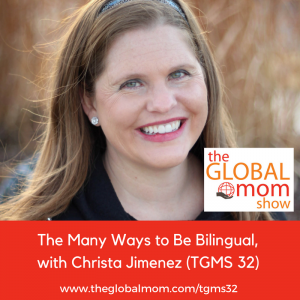
Giving your kids a global perspective is not as hard as you think
My parents did something for me without even realizing it. They gave me the gift of a global perspective, showing me that the world is greater than my own thoughts and my own space. They did this naturally, because of who they were and the relationships they had.
I still remember when I was about eight years old, leaning my ear against the door of my parents’ bedroom and listening to my dad’s friend Joshua speak on the telephone in Swahili to his family thousands of miles away in East Africa. This was in the days when a long distance phone call overseas was expensive and somewhat difficult to arrange. We loved when Joshua would come visit and show us pictures of his family and tell us stories about his country. I still remember the first taste of African peanut stew I had at the multicultural dinner at the school where my dad was studying. I loved the unexpected taste of peanut butter and chicken combined. My sisters and I jumped in Joshua’s arms and gave him hugs that he couldn’t get from his own six children who were still home, waiting for him to return from his year of study in the U.S.
Cultural understanding at that age was simple and sincere.
When you are a child, everything that is happening to you becomes your idea of normal, and so my idea of normal included learning about other countries and cultures from people such as Joshua.
In the days before car seats, I remember sitting in my dad’s lap in the front seat of our blue station wagon listening to him sing a German song, and slowly learning it myself. As soon as I could take a foreign language in school, I chose German, and when people asked why, I replied simply “because my Dad speaks it.” It was a good enough answer, and one that shows just how important early cultural impressions can be for children. My father never told me I should learn German, he never suggested that I study it, but it was something I naturally wanted to do.
My Dad also told us of the trip he’d taken in college around Europe, and I thumbed through photo albums of my mom’s trip to central America, where she visited Machu Pichu with my grandmother when they both worked at the same travel agency before I was born. Although we did not travel internationally as kids, we did our share of cross-country adventuring, taking regular road trips to Colorado and Florida, and enjoying the natural beauty found in the mountains and the ocean. Those trips taught me how to roll with things, sit still for long periods of time, and read in moving vehicles–all things that would come in handy later, on more international journeys.
My first trip without my parents was a chaperoned visit to New York City as part of a musical troupe that sang at the opening ceremony of the United Nations one fall. The Peace Child musical that I was a part of brought together Soviet and American youth to get to know one another and sing about the cause of nuclear disarmament and peace between our two countries. During this trip, we sang with our new soviet friends on satellite in the grand hall.
I don’t think my parents knew much about “multi-culturalism,” a phrase that only gained wide-spread use in the U.S. in the 1980s, but they were living it out naturally. And my sisters and I caught on, without much prodding. All three of us learned other languages, developed a love of travel, and cultivated a compassion for worldwide causes. We stay connected to global issues and enjoy spending time with people from all over the globe. That perspective has not only affected our study and career choices, but it has enriched our lives greatly. I consider my upbringing a gift in this way.
Now, as I’m starting to raise my own three boys in a rural and fairly homogeneous region, I often wonder how to share the same sort of cultural understanding with them. But when I think back to how it happened for me, I realize it’s not too difficult. All it really takes is an openness to opportunities for cross-cultural understanding–inviting someone from another country to dinner, listening to music from another continent, or encouraging travel of all types at an early age. All of these things helped open my eyes to the world around me and gave me the confidence to explore, learn, and love whatever I discovered.
If you are not naturally inclined to do those things, start small. Even the littlest things can have a lasting impact when it comes to your kids.
 Next Post
Next Post





Great post. This reminds me of when, years ago, Sarah Palin while running for VP of the US denigrated college kids taking a year abroad and lauded having only gotten a passport recently. It made me so mad.
I was a single parent and we were not rich, by any means, but I made a great effort to cultivate a global mind in my son! Far from being the privilege of the wealthy as Palin was criticizing, I feel travel and exposure to new the world’s cultures is a critical part of raising new millennium kids.
Thanks, Kristin. I totally agree with you that understanding the world’s cultures is a key to raising kids in this current time. Sounds like you did a great job with yours!